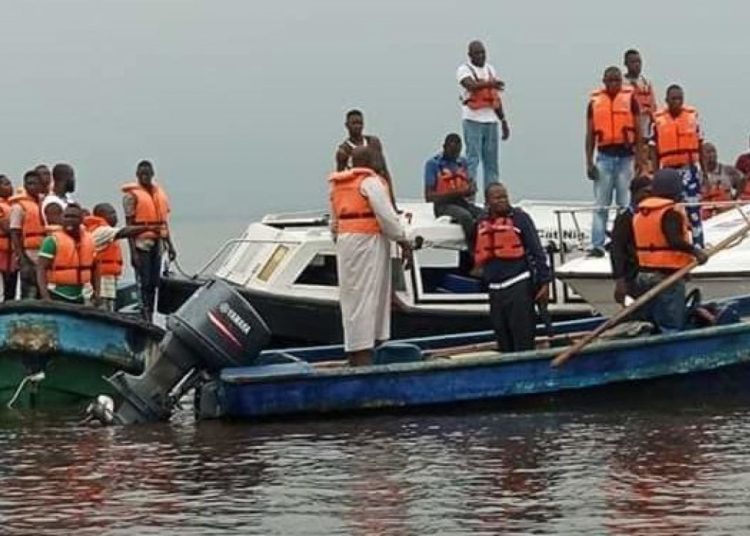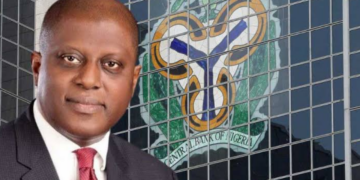In the last one week, about 79 Nigerians have lost their lives in various boat mishaps across the country. The mishaps which happened in Lagos and in Niger states have, however, elicited angry reactions from Nigerians who called for the overhaul of the NIgerian Inland Waterways Authority (NIWA) by the Federal Ministry of Transportation.
NIWA, the tagency responsible for the regulation of inland waterways transport in Nigeria has been identified as an agency not doing enough to end mishaps on the nation’s inland waterways.
Though, insider sources have, however, called on the federal government to increase funding to the agency, saying poor funding has affected regulatory functions of the agency.
For instance, there was an accident on July 6th, 2022 after a 20-seater boat ferrying 17 passengers to Victoria Island capsized.
After the incident and rescue operation, two persons were confirmed dead while 15 were rescued.
According to the general manager, Lagos State Waterways Authority (LASWA), Oluwadamilola Emmanuel, the accident happened in the early hours of the day and stated that investigation would be launched to unravel the cause of the accident as well as end subsequent mishaps.
Boat Mishap: NIWA Bans Night Voyage On Lagos Water
However, as Nigerians awaited the outcome of the July 6 incident, another mishap happened on July 9, claiming lives of 19 Nigerians and regrettably, the dead are all member of same family from Ibeshe, Mile 2, Lagos state traveling for Eid-el-Kabir festival.
According to the traditional ruler of the community, the Ovori of Ibeshe, Oba Alani Gausu, the victims, who were from the Sumola Aniajogun family of Ibeshe, were travelling for Sallah when they perished in boat a mishap.
According to him, the ill-fated boat sank after carrying passengers beyond its capacity as well as operating outside the time of safe navigation.
Oba Gausu also blamed lack of training, drug abuse and operating after regulatory hours by boat operators as challenges responsible for boat accidents on Lagos waterways.
He said, “The boat tragedy that resulted in the death of 17 boat passengers last Friday was down to human error. The boat driver failed to do what he ought to have done before loading passengers on the boat and pushing the boat into water. How can a boat driver load passengers on a boat, push the boat into the water before checking if he has the correct mixture of engine oil in the boat engine?”
He continued, “Due to this error from the boat driver, the tide pushed the fully loaded boat underneath a barge and the entire passengers, including the boat driver drowned. It all comes down to lack of training for boat drivers. Many of them are not educated, they operate under the influence of drugs and it is important that NIWA, Lagos State Waterways Authority (LASWA) and other stakeholders provide training for boat skippers.”
He, however, enjoined the NIWA to ensure adequate training for boat skippers, saying the boat that sank operated above its capacity.
“If boat skippers are well trained, the scenario where drivers operate outside the 6:30am to 6:30pm stipulated time won’t occur. The ill-fated boat that sank was carrying passengers beyond its capacity. The boat was overloaded and was operating outside the time for safe navigation. We need more training for boat drivers to ensure incidences like this does not repeat itself,” he added.
While Nigerians were still grieving the avoidable loss of 19 innocent lives, tragedy struck in Zumba village in Shiroro local government area of Niger state when a canoe ferrying over 50 passengers capsized on Saturday.
It was gathered that the canoe was said to have taken off from Iburo around 10am and was heading for Zumba town for the normal market day activities when the boat capsized in the middle of the water leaving many people dead.
“The canoe took-off from Iburo around 10am and was heading for Zumba town for the normal market day and I gathered that no fewer than 50 passengers were in the canoe when the incident occurred,” a villager said
It was gathered that similar incident occured in the same river last year where no fewer than 20 people perished.
However, despite these recurrent boat mishaps, the management of NIWA is yet to devise a means to improve safety or end mishaps claiming innocent lives on the nation’s waterway on daily basis.
In a statement released on Sunday, the authority’s Public Relations officer, Jubril Darda’u, asked passengers and boat operators to ensure they put safety on the front burner to end mishaps.
He said, “unless operators and passengers alike buy into the imperative of safety on the waterways, no amount of enforcement or compulsion on the part of regulatory bodies can effect the desired results.”
“We are all the more saddened because of the efforts we have put in place to ensure that basic safety guidelines and regulations are adhered to by boat drivers. Despite this, however, boat drivers and operators still sail in bad weather; overload their boats and oftentimes do not even wear life jackets for their own safety,” he stated.
However, the former president, National Association of Government Approved Freight Forwarders (NAGAFF), Dr Eugene Nweke, said since present NIWA management has no solutions to tackle incessant boat mishaps, the Transportation ministry should give the authority road map and direction to end accidents on the inland waterways.
In a chat with LEADERSHIP, he said, “When Chief Mrs CFO Ezenwa, the present Secretary to the Government of the Federation (SGF), and the current Minister of Transportation Engr. Mu’azu Sambo were in charge of the agency, were boat mishaps incessant?
“It has a lot to do with headship of the authority because when an industry inclined technocrat presides over an agency, it is a different ball game, but when a politician preside over the same agency, we know the outcome. I think the SFG and HMOT are administrative place to give the present administrator of the agency an advise and direction, especially for the good of the nation and its people.
“Also, I believe that the present MD is surrounded by able and experience senior colleagues, which adds up to show cause for the viability of the agency, so leaving the MD all alone to preside over the agency without recourse, means that, Nigeria and Nigerians are not the primary focus.”
He, however, advised the management of the agency to reach out to former heads of the agency for policy direction, advise and support, saying NIWA has no reason to have perform below par performance.
“NIWA has no reason to perform lesser than expected, if at all CONSOLIDATION matters, bearing succession in mind from its creation.
“In a nutshell, I think the DG need the help of the past MDs to come for his rescue for Nigerians sake because if NIWA continues like this, and they are not saying anything, then we may pin point them as being contributory to the NIWA abysmal administrative and regulative performance,” he told LEADERSHIP.
Also speaking, an Engineer, Engr. Tammy Fiberesima, said it’s high time government replanned the inland waterway transportation across the country to meet present realities.
According to him, there is need for the government to gradually phase out boats built with material such as woods, and to ensure access to training, retraining of boat operators.
According to him, to end boat mishaps, NIWA should come up with a set of workable strategies that are anchored on the prevailing kinds and nature of boat accidents recorded so far.
His words, “It’s the right time, to not only re-plan our inland waterway transportation holistically, but to correctly understand overloading, boat fits for purpose, seaworthiness, need for standardized boats and to gradually phase out boats built on certain material types such as wood.
“Also, vegetation along the river banks, access to training, retraining of boat operators, compulsory provision of manifest system and light houses, there should be special boating activities for market days especially markets located along waterfronts to care for peak movement of passengers, and instutionalising the clearing of all obstructions dotting waterways, especially the semi-submersibles.”
He continued, “safety is everybody’s business, but every group has a distinct role to play, while the regulating bodies are permitted to lead. Also, we need to professionally define the persistent problem that bedevilled our waterways as well identify the unsafe condition, act, and the combination of both, anchored on practical experiences.”





